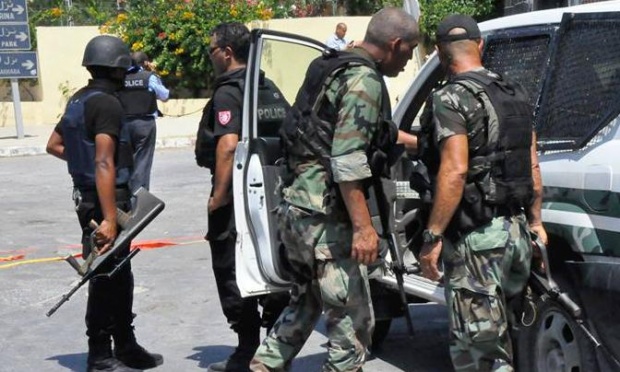The so-called Islamic State has claimed responsibility for an attack in Tunisia in which a young man pulled a Kalashnikov from a beach umbrella and began firing, killing at least 39 people.
The majority of those killed were British, Tunisia’s prime minister, Habib Essid, has reportedly said. Five of the 38 dead have so far been confirmed as Britons by the British foreign secretary, Philip Hammond, but he warned that number could rise.
The Site Intelligence Group reported Isis had claimed credit for Friday’s attack on its Twitter account as Essid said he would immediately close mosques outside the control of the ministry of religious affairs and call army reservists into active service and place them around the country.
“No mosque that does not conform to the law will be tolerated,” he said, referring to those that incite to terrorism.
Meanwhile, more survivors’ stories and details of the victims began to emerge. British tourist Tom Richards described the gunman as in his early 20s with long black hair and a beard when he faced him in a hotel corridor. The holidaymaker, who was there with his mother, escaped when the gunman inexplicably stopped firing.
Welshman Matthew James survived being shot three times when he used his body to shield his fiancée, Saera Wilson, during the shooting on Friday.
One of the dead was an Irish woman named as Lorna Carty, a nurse and mother of two from Co Meath. She had been in the resort with her husband Declan who had recently undergone heart surgery. It is understood the couple were given the holiday as a present from a family member to help with his recuperation.
Tunisia’s president, Beji Caid Essebsi, denounced the attacks at the RIU Imperial Marhaba hotel: “Once again, cowardly and traitorous hands have struck Tunisia, targeting its security and that of its children and visitors.”
Essebsi promised “painful but necessary” measures, adding: “No country is safe from terrorism, and we need a global strategy of all democratic countries.”
The slaughter took place on the beach between the Soviva and Imperial Marhaba hotels in the town of Sousse – a popular destination for holidaymakers from the UK and Ireland.
It was one of three deadly outbursts of violence on Friday, from Europe to North Africa and the Middle East, and followed a call to violence by Isis extremists.
A suicide bombing at a Shia mosque in Kuwait killed 27 worshippers in an attack that was later claimed by Isis. It was the first such attack in the mostly quiet and relatively secure Gulf Arab nation in more than two decades.
In France, a man was detained near Lyon after the severed head of his former employer was hung from the gates of a gas factory which he seemingly tried to blow up by ramming it with a car. Two people were injured. Police said they also found a flag with Islamist inscriptions.
The suspect, Yassine Salhi, was seized by an alert firefighter, authorities said, and French president Francois Hollande said the attacker’s intention had been to cause an explosion. Officials said the suspect had been known to intelligence services. A security alert for the south-east region was raised to its highest level for the next three days, and the US embassy in Paris warned American citizens to be vigilant.
It remains unclear if the attacks are linked but they came days after Isis militants urged their followers “to make Ramadan a month of calamities for the nonbelievers”. In all, the assailants killed at least 65 people.
In an audio recording released Tuesday, Isis called on its supporters to increase attacks during Ramadan and “be keen on waging invasion in this eminent month and commit martyrdom.”
The attack in Tunisia was the country’s worst ever and follows a massacre on March 18 at the national Bardo museum in Tunis that killed 22 people, again mostly tourists, and has called into question the newly elected government’s ability to protect the country.
source : The Guardian
Saturday
27 June 2015
6:30:53 AM
697549

Habib Essid promises action on mosques that do not ‘conform to the law’ and reportedly says most of those killed were British
